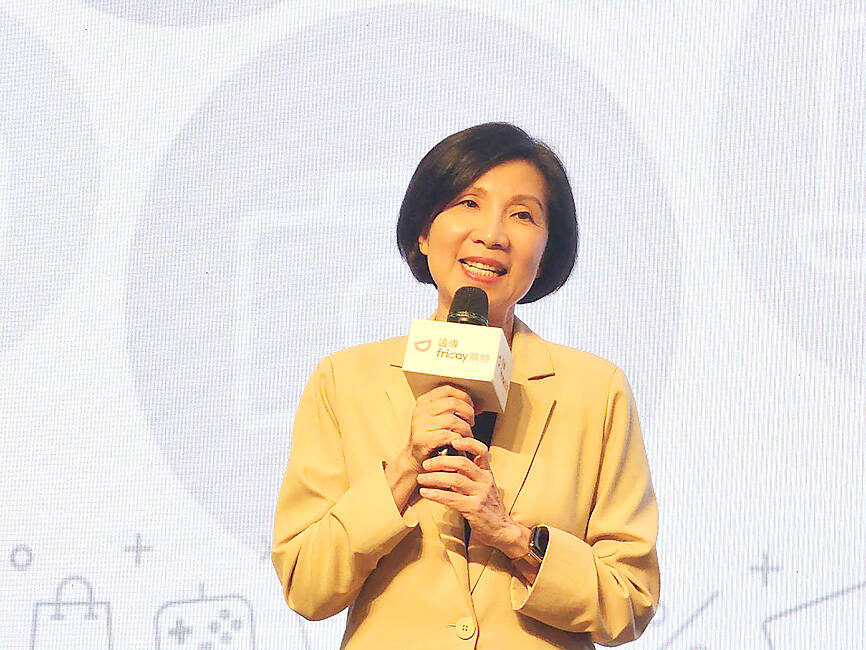Subscribers of Asia-Pacific Telecom’s (APT) telecom services would be given at least one-and-a-half years to fully migrate to Far EasTone Telecommunications’ (FET) networks if the National Communications Commission (NCC) and the Fair Trade Commission (FTC) approve their merger, the telecoms authority yesterday said at its weekly news conference.
The commission yesterday reviewed proposed mergers between FET and APT, and between Taiwan Mobile and Taiwan Star. Far EasTone president Chee Ching (井琪), APT chairman Steven Chen (陳鵬), Taiwan Mobile president Jaime Lin (林之晨) and Taiwan Star president Cliff Lai (賴弦五) were present to answer questions from NCC commissioners.
NCC Chairman Chen Yaw-shyang (陳耀祥), who presided over the meeting, ruled that discussions of the two cases would resume after the telecoms provide supplementary information to the commission within one week.

Photo: CNA
NCC Deputy Chairman and spokesman Wong Po-tsung (翁柏宗) said that commissioners focused on how the telecoms plan to address issues following the mergers — from the integration of telecom service networks to monthly plans for subscribers and job transition plans for employees of APT and Taiwan Star, which would cease to exist after the mergers.
FET said that it would take at least one-and-a-half years to complete the integration of its telecom service networks with those built by APT, while Taiwan Mobile said it would submit a timeline on the network integration in a written report, Wong said.
Integration of telecom service networks takes time, he said, citing similar cases in the EU, Malaysia and Thailand.
Overall, telecom service subscribers should benefit from the mergers, particularly those of APT and Taiwan Star, he said.
“Currently, APT service subscribers can only access the telecom’s 700MHz and 2,600MHz frequency bands. If APT’s merger with FET is approved, subscribers would also be able to access FET’s 1,800MHz, 2,100MHz, 2,600MHz and 3,500MHz bands. With more bandwidth, customers would enjoy better and faster services,” Wong said.
FET and Taiwan Mobile would be held responsible during the transition period if subscribers experience service disruption or other communication issues, NCC Department of Platform and Business deputy director Tsai Kuo-dong (蔡國棟) said.
FET and Taiwan Mobile told the commissioners that they plan to work with mobile virtual network operators to enhance their competitive edge and give consumers more service options, Wong said.
As the two proposed mergers would result in Taiwan Mobile and FET exceeding the legal limits on bandwith ownership, the commission will negotiate with the Ministry of Digital Affairs to resolve the problem, Wong said.
Taiwan Mobile’s proposed merger with Taiwan Star, if approved, would allow the nation’s second-largest telecom to own 60MHz of bandwidth at frequency bands below 1 gigahertz, which would exceed one-third — or 50MHz — of the total auctioned spectrum of 150MHz.
Regulations require telecoms to give any extra bandwidth back to the commission.

Alain Robert, known as the "French Spider-Man," praised Alex Honnold as exceptionally well-prepared after the US climber completed a free solo ascent of Taipei 101 yesterday. Robert said Honnold's ascent of the 508m-tall skyscraper in just more than one-and-a-half hours without using safety ropes or equipment was a remarkable achievement. "This is my life," he said in an interview conducted in French, adding that he liked the feeling of being "on the edge of danger." The 63-year-old Frenchman climbed Taipei 101 using ropes in December 2004, taking about four hours to reach the top. On a one-to-10 scale of difficulty, Robert said Taipei 101

A preclearance service to facilitate entry for people traveling to select airports in Japan would be available from Thursday next week to Feb. 25 at Taiwan Taoyuan International Airport, Taoyuan International Airport Corp (TIAC) said on Tuesday. The service was first made available to Taiwanese travelers throughout the winter vacation of 2024 and during the Lunar New Year holiday. In addition to flights to the Japanese cities of Hakodate, Asahikawa, Akita, Sendai, Niigata, Okayama, Takamatsu, Kumamoto and Kagoshima, the service would be available to travelers to Kobe and Oita. The service can be accessed by passengers of 15 flight routes operated by

Taiwanese and US defense groups are collaborating to introduce deployable, semi-autonomous manufacturing systems for drones and components in a boost to the nation’s supply chain resilience. Taiwan’s G-Tech Optroelectronics Corp subsidiary GTOC and the US’ Aerkomm Inc on Friday announced an agreement with fellow US-based Firestorm Lab to adopt the latter’s xCell, a technology featuring 3D printers fitted in 6.1m container units. The systems enable aerial platforms and parts to be produced in high volumes from dispersed nodes capable of rapid redeployment, to minimize the risk of enemy strikes and to meet field requirements, they said. Firestorm chief technology officer Ian Muceus said

MORE FALL: An investigation into one of Xi’s key cronies, part of a broader ‘anti-corruption’ drive, indicates that he might have a deep distrust in the military, an expert said China’s latest military purge underscores systemic risks in its shift from collective leadership to sole rule under Chinese President Xi Jinping (習近平), and could disrupt its chain of command and military capabilities, a national security official said yesterday. If decisionmaking within the Chinese Communist Party has become “irrational” under one-man rule, the Taiwan Strait and the regional situation must be approached with extreme caution, given unforeseen risks, they added. The anonymous official made the remarks as China’s Central Military Commission Vice Chairman Zhang Youxia (張又俠) and Joint Staff Department Chief of Staff Liu Zhenli (劉振立) were reportedly being investigated for suspected “serious